Search titles
Displaying results 1 to 10 of 76.
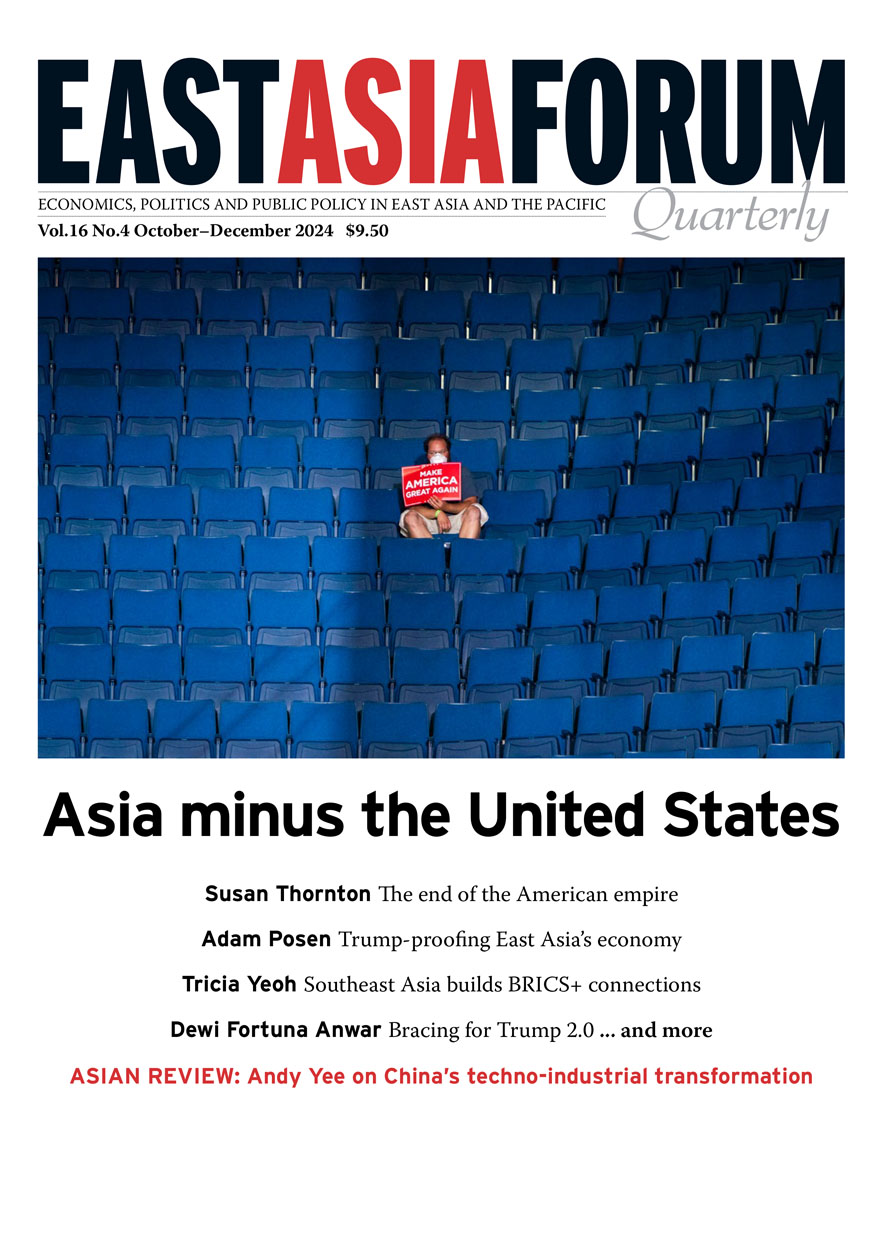
East Asia Forum Quarterly: Volume 16, Number 4, 2024 »
Publication date: December 2024
The global economy’s trajectory toward instability has been evident since Trump 1.0. A second Trump presidency will likely amplify protectionism, strategic competition and global disorder. This edition of East Asia Forum Quarterly examines how Asia can respond, emphasising the region’s role in defending multilateralism, addressing climate change and ensuring global stability.
Download for free
Not available for purchase
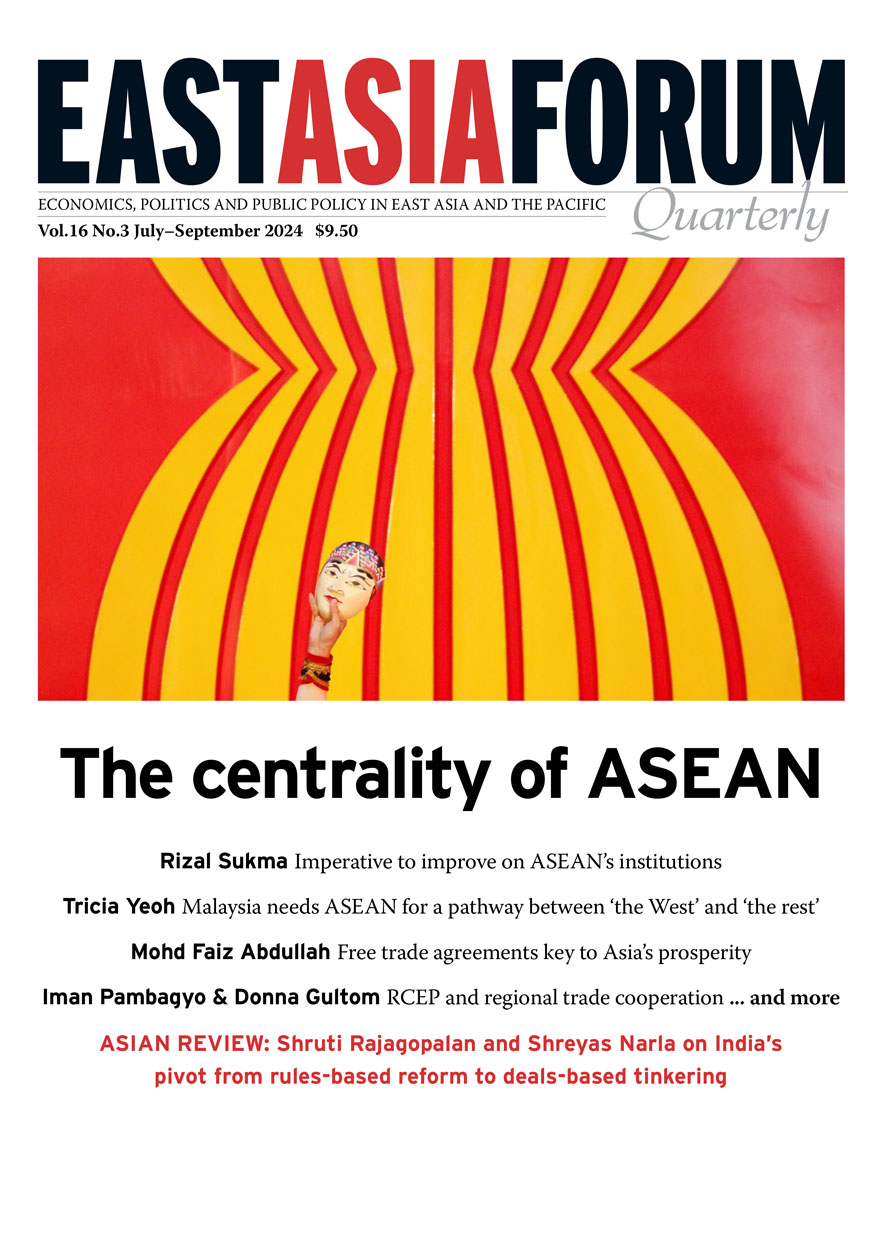
East Asia Forum Quarterly: Volume 16, Number 3, 2024 »
Publication date: September 2024
ASEAN's rise as the cornerstone of regional diplomacy and security in the 1990s may have seemed improbable, but it was crucial. Today, a shifting regional geopolitical landscape challenges ASEAN’s relevance. Great power competition and waning global political commitment to multilateral arrangements threaten its role as East Asia’s 'steering committee'. This edition of East Asia Forum Quarterly explores how ASEAN can maintain its centrality, calling for proactive leadership and stronger regional cooperation.
Download for free
Not available for purchase
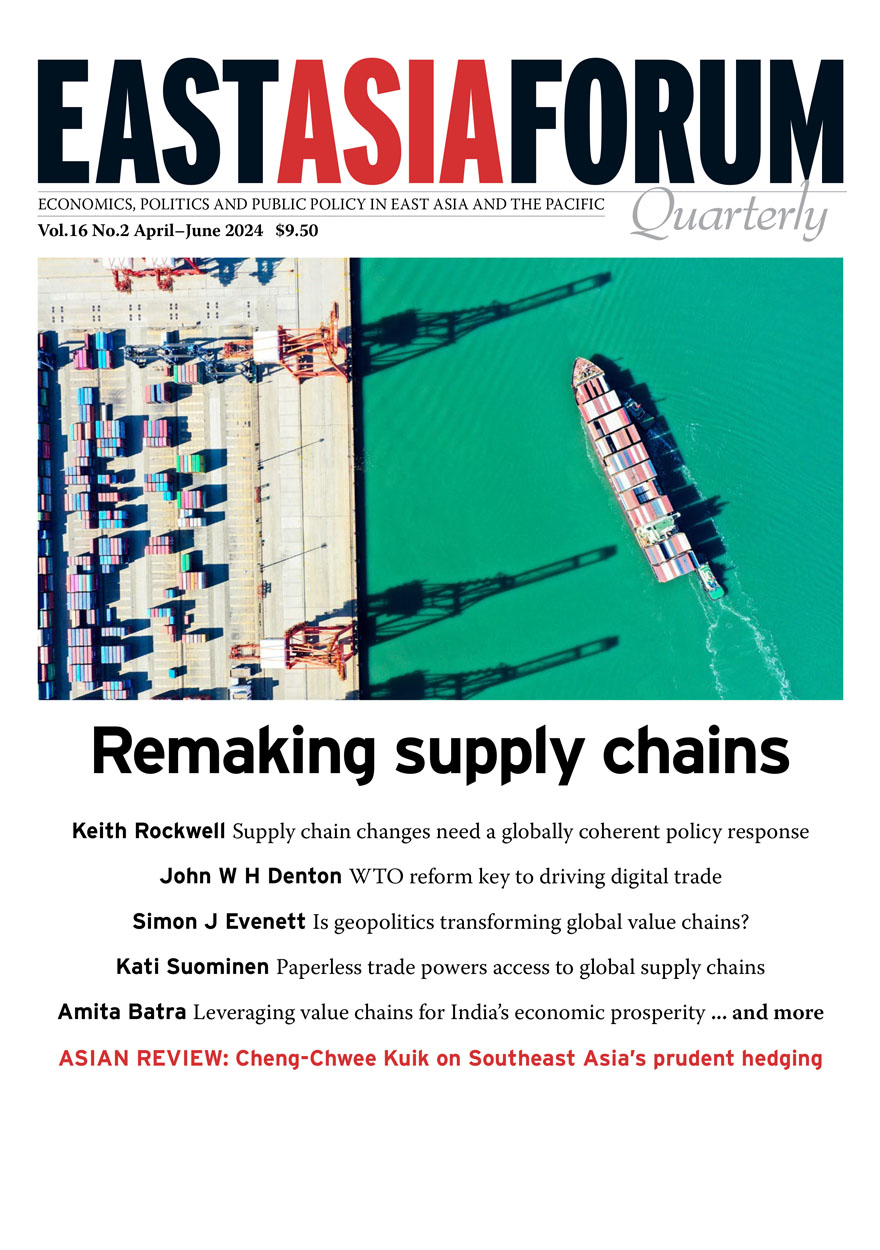
East Asia Forum Quarterly: Volume 16, Number 2, 2024 »
Publication date: June 2024
Key in globalisation, supply chains connect producers to consumers across nations and specialisations. Recently, geopolitics, the COVID-19 pandemic and European conflicts have reshaped these networks. Supply chains are increasingly influenced by statecraft and protectionism, moving away from multilateral cooperation. This issue of East Asia Forum Quarterly explores the rapid transformation of supply chains, the paradox of digital innovation in trade and the consequences of economic isolationism.
Download for free
Not available for purchase

East Asia Forum Quarterly: Volume 16, Number 1, 2024 »
Publication date: April 2024
As India charts its post-colonial journey, its pursuit of great-power status intensifies. This issue of East Asia Forum Quarterly delves into India's regional and global positioning, exploring avenues to leverage its economic, demographic and geopolitical advantages. Key insights highlight India's subordinate role to China in the Asia-Pacific, the need for job creation in manufacturing, revamp education and seize opportunities in global manufacturing. As India heads to the polls, its future trajectory hinges on addressing these complexities.
Download for free
Not available for purchase

East Asia Forum Quarterly: Volume 15, Number 4, 2023 »
Publication date: November 2023
It’s back: the past decade has seen a remarkable resurgence of industrial policy in the developed world. Geopolitical fragmentation and resultant suspicions of international trade, the politically induced adoption of second-best industrial policies to address carbon emissions, and the use of manufacturing incentives sparked by fears of deindustrialisation and widening inequality risk tit-for-tat protectionism and further splintering of the global economy. This issue of East Asia Forum Quarterly examines what the new enthusiasm for industrial policy activism means for the global system and Asian economies: exploring its effects on the ability of emerging Asian economies’ to break into manufacturing in global value chains; investigating how measures aimed at encouraging domestic processing of raw materials affect the stability of policy environments and green industrialisation; detailing and comparing the experiences of major regional economies with policy developments in semiconductor and electric vehicle manufacturing and renewable energy; and appraising industrial policy’s effects on smaller economies and the rules-based trading system from a global perspective.
Download for free
Not available for purchase

East Asia Forum Quarterly: Volume 15, Number 3, 2023 »
Publication date: September 2023
As ASEAN and Japan celebrate the 50th anniversary of their official relationship, the challenge to redefine the goals and purpose of this relationship is now pressing. Great power rivalry, regional power relativities, and sweeping political and economic disruption have injected new dynamics and exposed serious vulnerabilities. With ASEAN member states and Japan each facing their own domestic challenges, the opportunity presents itself for a more 'equal' partnership that is able to 'co-create' a regional economy and society, from paternalistic origins. This issue of East Asia Forum Quarterly addresses these challenges for the ASEAN–Japan relationship and offers ideas, vision and initiatives that might guide its future: exploring the policy options for a relationship challenged by regional economic fragmentation; detailing the lessons available for policymakers beginning to act on sustainability and digital and green transformation; and examining the opportunities taken and thus far unrealised for the fashioning of new soft diplomacy and investment in intra-ASEAN infrastructure.
Download for free
Not available for purchase

East Asia Forum Quarterly: Volume 15, Number 2, 2023 »
Publication date: June 2023
Global trade stands at a crucial crossroads. The multilateral trading system that underpinned globalisation for three-quarters of a century is being pulled apart by big power politics and the way forward is fogged in mistrust. Global growth is projected to decline this year and remain anaemic. Inflation, the rising rivalry between the world’s two largest economies, and Russia’s invasion of Ukraine weigh heavily on the global outlook. The European war underscores how quickly the trading ties between nations might be undone and weaponised. This issue of East Asia Forum Quarterly examines the impact of trade sanctions as they rip into the trading system well beyond the battlefield. It interrogates how far sanctions have succeeded in hobbling Russia’s war machine and questions their deterrent value outside of conflict or their universal application, explores how supply chains have reshuffled around the reach of regulators, and asks how nations are probing opportunities created by the conflict.
Download for free
Not available for purchase
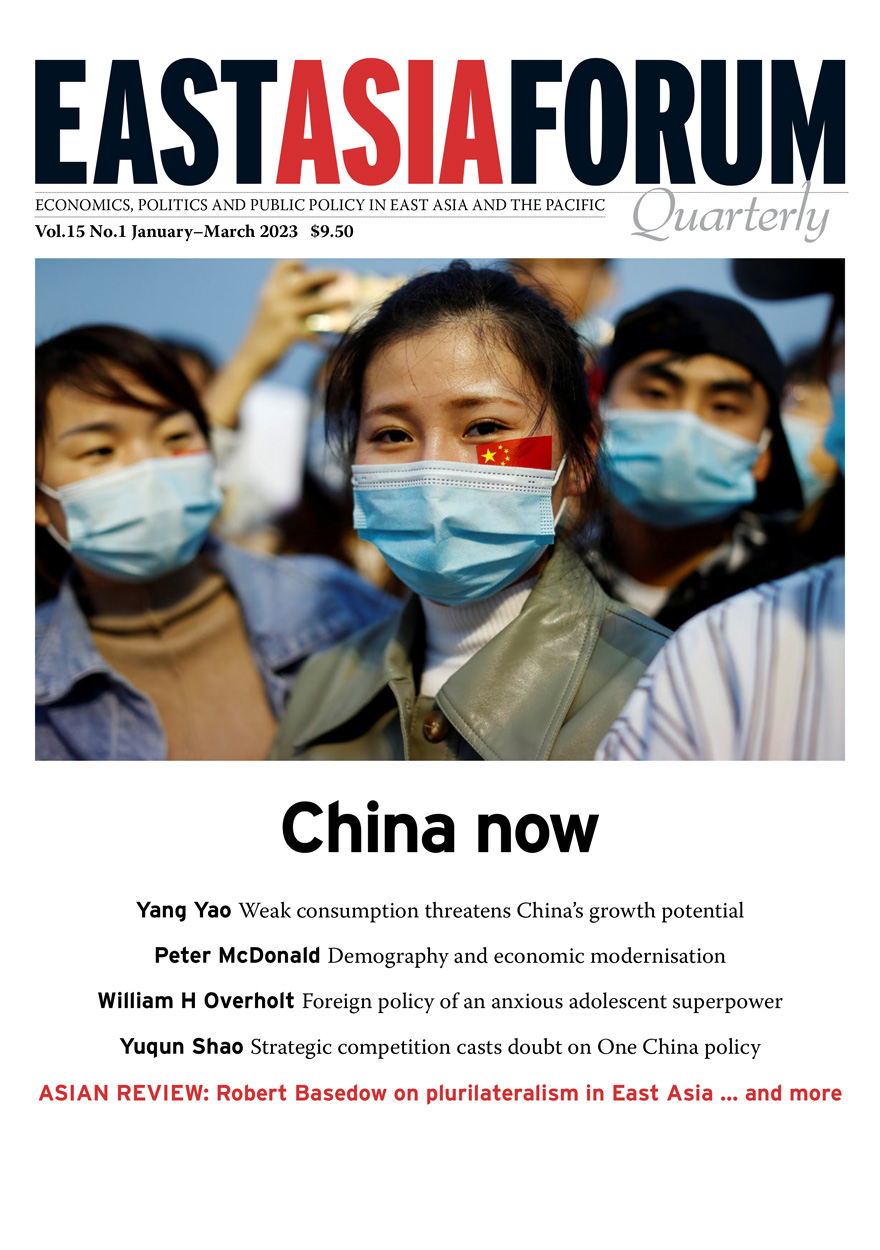
East Asia Forum Quarterly: Volume 15, Number 1, 2023 »
Publication date: March 2023
While many rejoice in something like ‘normality’ after the years of disruption caused by the global COVID-19 pandemic, the world will not resume its former shape. Nowhere is this more evident than in China. After the disastrous economic performance of 2022, a recalibration of China’s policies was essential—including by retreating from zero-COVID and, under the banner of ‘Chinese-style modernisation’, relaxing restrictions on the free market. China’s greatest post-pandemic challenge, however, will be the terms of its engagement with the outside world. Its claims to both developing-nation status and global leadership define China, some say, as an ‘anxious adolescent superpower’. This issue of East Asia Forum Quarterly canvasses a range of shifts in Chinese society and daily life as well as policy direction: describing women’s leading role in the calls for social change, explaining how China’s demographic crunch is unlikely to affect its economic modernisation over the coming two decades, examining the difficulties faced by rural migrants and in investing in the education of the rural young, and detailing the public response to the poorly understood social credit system.
Download for free
Not available for purchase
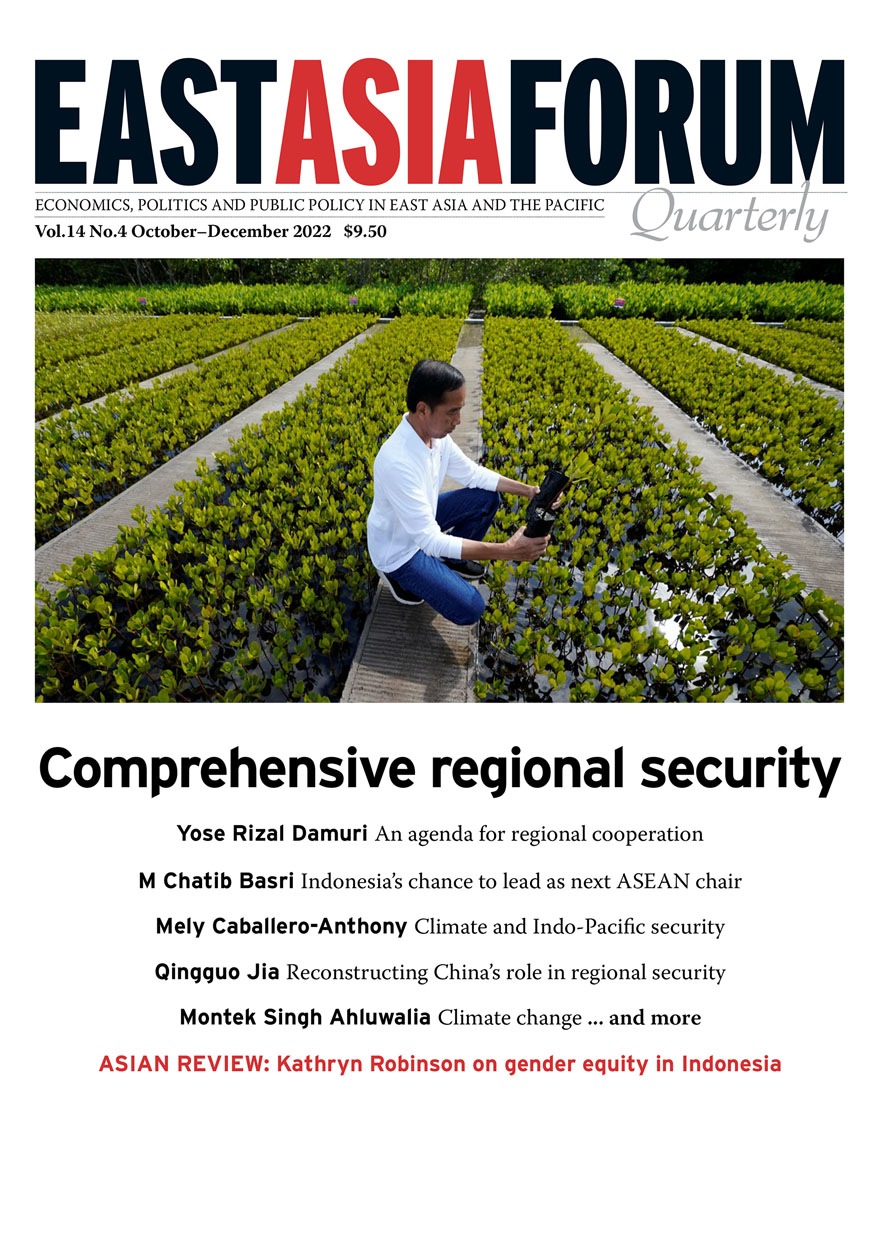
East Asia Forum Quarterly: Volume 14, Number 4, 2022 »
Publication date: December 2022
Southeast Asian nations have long understood that effective national security goes well beyond military preparedness, encompassing a variety of ‘non-traditional’ security issues. This idea is at the heart of political cooperation within ASEAN and competes with traditional notions of regional security in East Asia. But the vocabulary that has developed in the face of growing geopolitical tensions—decoupling, dual circulation, friendshoring, ‘strategic’ supply chains, securitisation—suggests that the big powers are working towards their own notion of comprehensive security.
Contributors to this issue of East Asia Forum Quarterly recognise that comprehensive regional security—an approach that embraces economic, environmental and energy security as well as military interests and considers how they are secured within today’s economically interdependent and politically cooperative regional system—can only be secured collectively: one country’s resilience to climate change, or its access to free and well-served markets for energy and food, cannot come at the expense of others.
Download for free
Not available for purchase
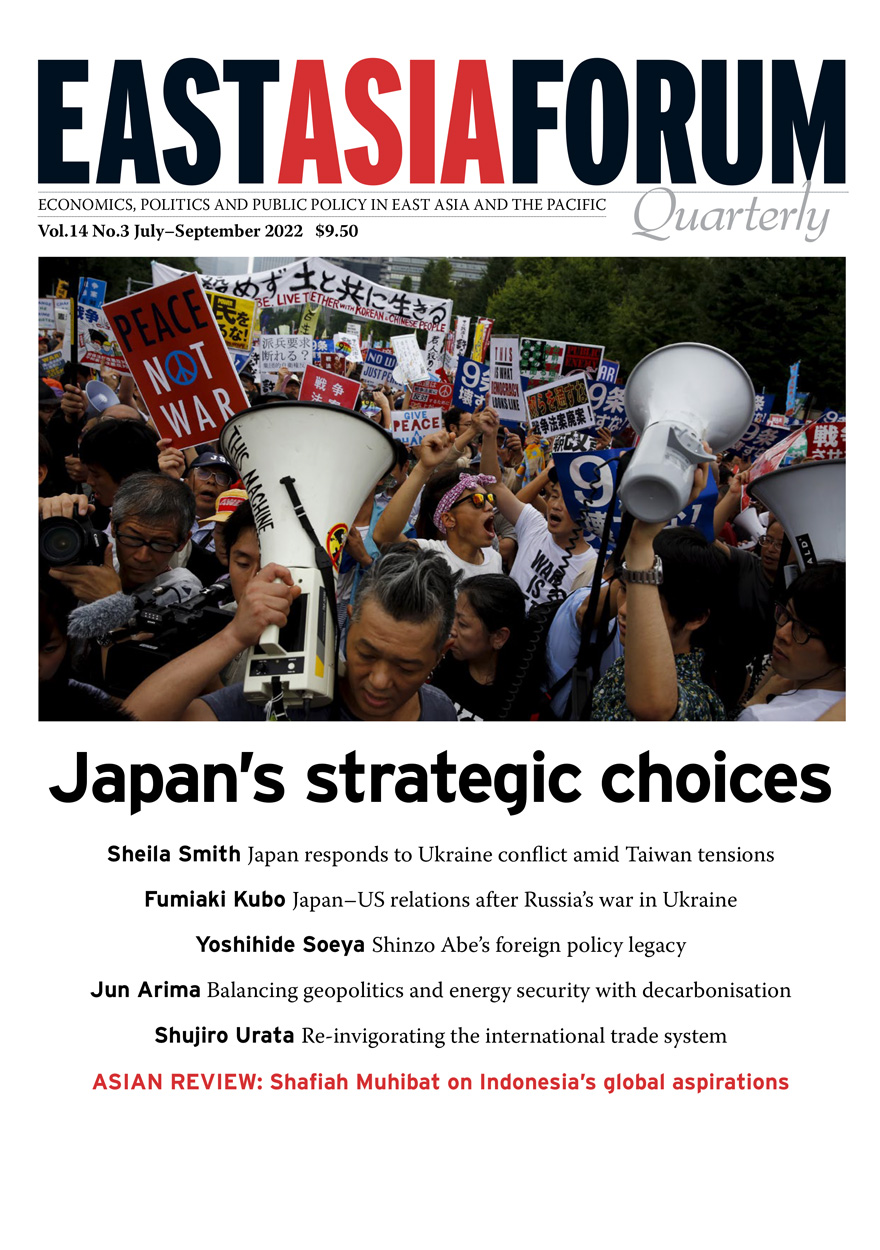
East Asia Forum Quarterly: Volume 14, Number 3, 2022 »
Publication date: September 2022
Japan ‘crossed the Rubicon’ after Russia’s invasion of Ukraine. Unlike eight years ago when Russia annexed Crimea, the Kishida government quickly implemented sanctions against Russia with other Western countries. Japanese people have generally stood behind the Kishida government’s foreign and security policy activism, yet uncertainties about Japan’s future remain. Can Japan confront ‘a three-front war’ against China, North Korea and Russia? How can Japan manage its relations with the United States and China amidst great power competition and a growing risk of military conflict? How can it cope with inflation, energy shortages, global warming and the crisis of the nuclear non-proliferation regime? Domestically, Japan has yet to escape from the impact of COVID-19. Maintaining international competitiveness in an era of ageing and shrinking population remains a top priority for Japan. The articles in this EAFQ examine the challenges and opportunities facing Japan and explore its future in an era of growing uncertainty.
Download for free
Not available for purchase



